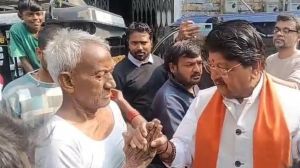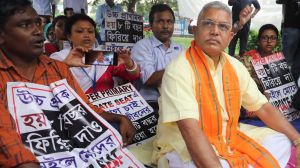Pre-emptive strike is not the answer
Amidst the belligerence over nuclear tests by India and Pakistan, hawkish statements by some senior BJP leaders have fuelled rumours of pre-...

Amidst the belligerence over nuclear tests by India and Pakistan, hawkish statements by some senior BJP leaders have fuelled rumours of pre-emptive strikes on areas in Pakistan Occupied Kashmir where terrorists and mercenaries are reportedly getting indoctrination and weapon training. This rhetoric coincides with the killing of 21 villagers in Samani in Bhimbher district of POK in the last week of April. Pakistan has blamed India for the Samani killings 8211; a charge vehemently denied by Indian agencies.
Whether or not there was an Indian hand in these killings, retaliation is an accepted policy of at least some of the embattled countries including Israel. In fact Israel is known to demonstrate retaliation even beyond its immediate borders when there is an attack on any Israeli anywhere in the world.
Pakistan has been accusing India of retaliatory strikes even in the past. In 1991, Pakistan accused Indian Army of shelling Aathmuqam village in POK to rubble following terrorist activity on the Indian side.In 1995 when there were repeated rocket attacks on Punch town, there was an explosion in a mosque in POK, which was blamed on the Indian Army by Pakistan. Such retaliatory tactics could give another dimension to the ongoing violence in Kashmir.
Though India is not as vulnerable as Israel which is surrounded by hostile states, recent statements of the BJP leaders stem from increasing desperation over Pakistan8217;s continuing support to the separatist movement in the Kashmir Valley. More-over, as India does not recognise Pakistan8217;s sovereignty over the occupied areas of Kashmir, it feels that such retaliatory measures are easily explained.
While one appreciates the fact that we cannot afford to be hamstrung by indecisiveness there are inherent dangers in retaliation. This writer has been to POK a number of times and is familiar with the territory. Since the camps8217; are well camouflaged, accurate military strikes will be difficult and will result in high collateral damage to innocent lives. This will resultin India losing the high moral ground and also invite international condemnation.
Moreover, picking on targets for pre-emptive strikes will not be easy, for the Pakistan help to terrorists in Jamp;K is not limited to these camps8217; in POK. For example, way back in 1990-1991, during a visit to Rawalpindi, one was astonished to be taken to a house belonging to a breakaway group of JKLF headed by Farooq Haidar and Rashid Hasrat. At least two dozen people armed with AK-47 rifles were openly moving around in the house which was well guarded by Pak security forces.
In POK itself, though blatant terrorist activity may not be visible, offices of political organisations like Jamait-e-Tulba and Hizbul Mujahedin in Muzaffarabad, the capital of POK, definitely provide impetus to terrorism in the Valley. Muzaffarabad, which is situated at the confluence of two rivers Jhelum and Neelam 8212; is the nerve centre of the whole movement for liberation8217; of Kashmir.
During my visits, I could comprehend two kinds of camps8217; inPOK. First, the camps housing people including men, women and children who had migrated from the border areas in Jamp;K mainly during Jagmohan8217;s tenure as governor.
Most of these were either close to Muzaffarabad, like Raru Ambore, or along the two rivers, like Karka Pataka and Hathian. No armed activity in any of these camps was visible.
Though Pak and POK officials were very secretive, one was able to glean some information from locals on the second kind of camps8217;, where arms training was reportedly conducted. Two places called Garhi Dupatta and Loonbagla, about 15-20 km deep from Chakothi along Jhelum river on the LOC, were particularly mentioned as having camps8217; Chakothi is on the old Srinagar-Muzaffarabad route, from where Srinagar is 120 km. This is where the Indian troops had to open fire on the people from POK who tried to cross over in 1990-91 following trouble in the Valley.
However, the main arms training was reportedly imparted then in areas deep inside the Pak territory. One such placementioned was Par Chinar in NWFP, where the recruits were taken in jeeps by ISI handlers and exposed to Afghan Mujahideen8217;.
Tougher attitude could make it difficult for Pakistan to abet terrorist activity in the Kashmir Valley. Since the border is heavily guarded, hot pursuit except for 200 to 300 metres is more or less ruled out. Actions like pre-emptive strikes either from the air or by artillery shelling is bound to result in the loss of innocent lives. This will be exploited by Pakistan which could bring in foreign television crews to show the ugly face of India.
Moreover, inaccurate strikes could alienate more people and force them into the world of terrorism. As a former CIA director, Stansfield Turner, once said: 8220;What we may think of as justifiable counter-terrorism is someone else8217;s terrorism.8221; Since pre-emptive strikes raise moral and ethical issues, unless the military response is carefully embellished with statecraft, the fallout will be enormous.
- 01
- 02
- 03
- 04
- 05































